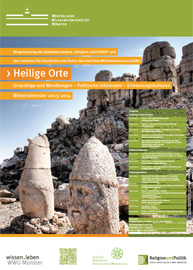Holy Places
Origins and changes – political interests – commemorative cultures
Tuesdays, from 6.15 to 7.45 p.m., Lecture hall F1 at the Fürstenberghaus, Domplatz 20-22

In the coming winter semester, the public lecture series of the Cluster of Excellence “Religion and Politics” and the Centre for the History and Culture of the Eastern Mediterranean (Centrum für Geschichte und Kultur des östlichen Mittelmeerraums, GKM) of the University of Münster will deal with “Holy Places”. Holy places develop at distinctive sites in nature where people experience an existential strengthening of their vital energies and perceive this as an effect of transcendent forces, according to Prof. Dr. Reinhard Achenbach, Old Testament biblical scholar and speaker of the GKM. Religious communities often connect mythical narratives and magical rituals with those places where people experience feelings of security and expansions of consciousness. In the course of history, holy places become highly important for man’s self-conception in the world. Political societies use them to interpret the world and legitimise rule. For that reason, they are subject to historical change and the wavering history of the human mind and its ideas.
The lecture series looks into the origins, transfigurations and functions of holy places. Even the oldest sacred sites of mankind served the cosmic world orientation (such as the mountain sanctuary Göbekli Tepe), the legitimation of rule (such as Nippur in Mesopotamia) and the expression of hopes for the afterlife (such as Abydos in Egypt). The forms religions took changed. Thus, an ancient Syrian storm god could become the Roman soldier god Jupiter Dolichenus. Several cult figures could merge at one location, as did the Canaanite and the Israelite religions in ancient Jerusalem, for example.
Political and economic interests were often linked with holy sites, as was the case in Delphi, Olympia, Jerusalem and Rome. Despite historical change, some of the holy places are still important today. The lecture series will therefore also investigate the nature of the impact of locations like Rome, Byzantium or Istanbul respectively, Jerusalem and Madinah, which have been influencing our commemorative cultures to this day. A special feature of the lecture series is a tutorial in which the lecture’s subject can, together with the speaker, be enlarged upon. It is open to students and researchers from all subjects of the degree programme Ancient cultures of the Eastern Mediterranean (Antike Kulturen des östlichen Mittelmeerraums, AKOEM) and takes place on Tuesdays from 2 to 4 p.m., Johannisstraße 4, room JO 101. Further information is included in the electronic university calendar of WWU. (exc/bhe)
ProgrammE
Origins and changes |
||
| 22.10.2013 | Hans Neumann, Münster | Nippur – Die heilige Stadt der Sumerer |
| 29.10.2013 | Julia Budka, Wien | Abydos – Zentrum des Totenkultes der Pharaonen |
| 05.11.2013 | Klaus Zimmermann, Münster | Zwischen Tyros und Tanger – Die Religion der Seefahrer |
| 12.11.2013 | Reinhard Achenbach, Münster | Jerusalem in vorchristlicher Zeit: Gottesstadt im Völkerkampf |
| 19.11.2013 | Engelbert Winter, Münster | Das Heiligtum des Iuppiter Dolichenus auf dem Dülük Baba Tepesi (Südosttürkei) – Ein „Heiliger Ort“ zwischen Transformation und Kontinuität |
Political interests |
||
| 26.11.2013 | Ulrich Sinn, Würzburg | Auf der Suche nach den Wurzeln des Erfolgs – Die Rolle von Orakel und Wettkampf im Kult von Delphi und Olympia |
| 03.12.2013 | Klaus Schmidt, Erlangen-Nürnberg | Göbekli Tepe – Ein Bergheiligtum der Steinzeit |
| 10.12.2013 | Wolfgang Hübner, Münster | Roma Aeterna – Eine heilige Stadt in vorchristlicher Zeit? |
Commemorative cultures |
||
| 17.12.2013 | Johannes Hahn, Münster | Wie können Orte Christen heilig sein? – Konstantins „Entdeckung“ des Heiligen Landes und die Anfänge einer christlichen Sakraltopographie in der Spätantike |
| 07.01.2014 | Michael Grünbart, Münster | Entlegene Orte: Mönche, Einsiedler, Heilige und ihr Publikum |
| 14.01.2014 | Georgios Makris, Münster | Byzanz – Konstantinopel – Istanbul |
| 21.01.2014 | Hans G. Kippenberg, Bremen | Heilige Orte der Antike in der Gegenwart |
| 28.01.2014 | Max Küchler, Fribourg | Jerusalem – Al Quds |
| 04.02.2014 | Werner Ende, Freiburg | Medina - Stadt des Propheten und Camposanto des Islams |
Winter Semester 2013/2014
Tuesdays,18.15 bis 19.45 Uhr
Lecture hall F1 at the Fürstenberghaus
Domplatz 20-22
48143 Münster

